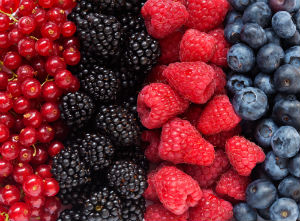Top 9 Anti-aging Antioxidants |  |
| Posted: 03 Nov 2014 07:00 AM PST  For years, scientists believed aging was a foregone conclusion and out of our control. Recent research, however, indicates that we have more authority over the aging process than previously realized. In fact, aging has more to do with the stress and function of our cells than it does with the number of candles on our birthday cake. The best way to protect cells from aging involves regular consumption of potent antioxidants, many of which are freely available in plant-based foods.
Antioxidants and AgingBy now, you've probably heard the buzz about antioxidants. These compounds, while promising, aren't the only solution to the aging process, nor are they the magic bullet when it comes to disease prevention. Antioxidants are, however, potent compounds that aid an overall healthy lifestyle by supporting cellular health. They are indicated as powerful molecules that combat the aging process in more ways than one. These next 9 antioxidants are at the top of their class for healthy aging. #1. Astragalus RootA chemical in astragalus root, TAT2, stimulates the production of telomerase, an enzyme that aids telomere repair. Short telomeres indicate damaged DNA and are the key contributors to increased cellular aging. Astragalus root also supports the liver's toxin-removing actions by acting as a diuretic. The increased urine flow flushes the kidneys and prevents toxin buildup. #2. ResveratrolThe French Paradox made resveratrol famous for its role in promoting longevity. Present in red wine, chocolate, and peanuts, resveratrol is unique among antioxidants for its ability to cross the blood-brain barrier and deliver potent soothing properties and free radical scavenging actions directly to brain cells. Its effect mimics caloric restriction, a proven anti-aging dietary strategy. #3. PterostilbeneSimilar to resveratrol in function, pterostilbene may actually be a more powerful antioxidant. Like resveratrol, it mimics caloric restriction which slows aging and promotes healing. Researchers have found it very effective for protecting and rejuvenating brain cells, balancing blood sugar, and maintaining healthy cholesterol levels. [1] #4. Pyrroloquinoline Quinone (PQQ) Disodium SaltOften called PQQ Na, this non-protein co-enzyme facilitates cellular metabolic processes and stimulates mitochondrial regeneration, an essential factor in slowing the aging process. It also neutralizes free radicals and reactive oxygen species (ROS), compounds that expedite physical aging. [2] #5. Digestive and Systemic EnzymesDigestive enzymes work only in the digestive tract, while systemic enzymes support digestion and also enter the bloodstream to clear toxins, fibrins, and allergens. Systemic enzymes, also called proteolytic enzymes, support immune function, target and reduce inflammation, and improve circulation. #6. R-lipoic AcidAlpha-lipoic acid comes in two forms, r-lipoic acid (the most bioavailable and bioactive form) and s-lipoic acid. Lipoic acid plays a crucial role in mitochondrial energy creation which makes it an important part of the cellular life cycle. Inadequate levels leads to faster aging, and like other factors in mitochondrial processes, lipoic acid possesses a strong antioxidant effect. #7. Pomegranate ExtractAnthocyanins give pomegranates their red color and offer a powerful dose of antioxidants. Punicalagins specifically support cardiovascular well being, neural synaptic health, and possibly reduce AGEs (advanced glycation end products). AGEs are associated with type II diabetes and Alzheimer's Disease and are just one of the accelerators to the aging process. [3] #8. Tibetan RhodiolaTibetan monks consider Rhodiola the supreme herb. Two potent compounds in the herb–salidroside and rosavin–act as antioxidants, protect nerves and brain cells, extend physical performance, and increase feelings of well being. #9. CoQ10Every cell in the body requires Coenzyme Q10 to produce ATP. As a factor in the metabolic process, it acts as an antioxidant to neutralize free radicals protecting the cell, DNA, and mitochondria from oxidative damage. Although the body naturally produces CoQ10, supplementation alleviates the symptoms of chronic disease and fatigue and supports general cardiovascular health. A Final ThoughtThe human body naturally produces several of these antioxidants: CoQ10, PQQ, R-lipoic acid, and the digestive and systemic enzymes. Often, environmental and dietary toxins (such as HFCS, aspartame, MSG, etc.) overload the body's stores of these native antioxidants. This leads to cellular dysfunction and cell death, physical imbalances, and accelerated aging. I personally recommend supplementing with these native antioxidants to provide the best possible support for the body. As the body ages, it needs additional support. Do you supplement with antioxidants? Please let us know which ones in the comments! -Dr. Edward F. Group III, DC, ND, DACBN, DCBCN, DABFM References:
The post Top 9 Anti-aging Antioxidants appeared first on Dr. Group's Natural Health & Organic Living Blog. |
| You are subscribed to email updates from Natural Health & Organic Living Blog To stop receiving these emails, you may unsubscribe now. | Email delivery powered by Google |
| Google Inc., 1600 Amphitheatre Parkway, Mountain View, CA 94043, United States | |
No comments:
Post a Comment